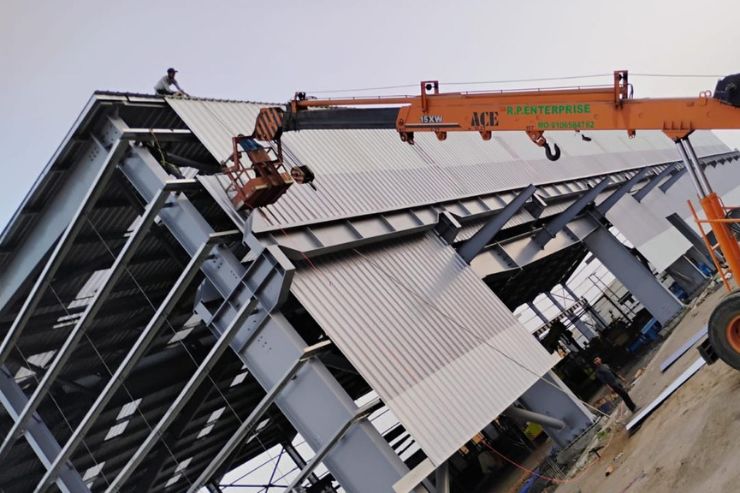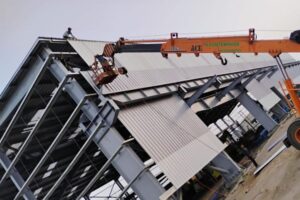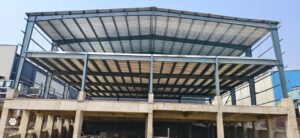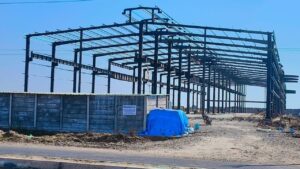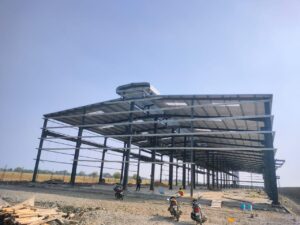Table of Contents
ToggleIntroduction
Pre-Engineered Buildings (PEBs) have become a game-changer in modern construction, offering faster timelines, cost efficiency, design flexibility, and long-lasting durability. Whether it’s an expansive warehouse, a manufacturing plant, or a shopping complex, PEBs provide reliable and scalable solutions.
However, one common question arises: Do PEB manufacturers design industrial and commercial buildings differently? The answer is yes. While both structures use the same engineering principles, the purpose, design, scale, and customization requirements vary greatly.
What Do PEB Manufacturers Do?
PEB manufacturers specialize in designing, fabricating, and assembling steel-based structures that are pre-engineered to specific project requirements. They provide:
- Design and Engineering – creating bespoke blueprints using advanced software.
- Fabrication – manufacturing steel components like columns, beams, trusses, and purlins.
- Transportation & Assembly – delivering components to the site for quick installation.
- Customization – offering tailored solutions for different applications (industrial or commercial).
Industrial PEB Buildings: Role of Manufacturers
Industrial projects require robust, large-span, and functional structures that can handle heavy equipment, production lines, and logistics operations.
Key Features PEB Manufacturers Focus on for Industrial Projects:
- High Load-Bearing Capacity – Designed to support heavy cranes, machinery, and storage systems.
- Large Clear Spans – Open spaces without internal columns for smoother industrial operations.
- Durability & Safety – Strong resistance to fire, corrosion, and extreme weather.
- Cost-Effectiveness – Optimized steel usage to reduce construction costs.
- Ease of Expansion – Flexible designs for future extensions and modifications.
Examples:
- Factories
- Warehouses
- Power plants
- Cold storage units
- Industrial workshops
Commercial PEB Buildings: Role of Manufacturers
Commercial projects require aesthetic appeal, customer-centric design, and multifunctional spaces in addition to structural strength.
Key Features PEB Manufacturers Focus on for Commercial Projects:
- Attractive Architecture – Sleek facades, glass finishes, and stylish roofing systems.
- Energy Efficiency – Insulated panels, natural lighting, and ventilation systems.
- Space Utilization – Designs that maximize customer interaction and comfort.
- Safety & Compliance – Fire safety, crowd management, and compliance with commercial codes.
- Customization – Adaptable layouts for retail, offices, and multi-purpose halls.
Examples:
- Shopping malls
- Multiplexes
- Showrooms
- Office complexes
- Sports arenas
Industrial vs. Commercial PEB Buildings: The Major Differences
| Factor | Industrial PEB Buildings | Commercial PEB Buildings |
| Purpose | Manufacturing, logistics, production | Retail, customer interaction, business activities |
| Design Focus | Functionality, strength, load capacity | Aesthetics, space utilization, comfort |
| Size & Scale | Large spans with minimal interiors | Moderate to large, with partitioned spaces |
| Customization | Expansion-friendly layouts for operations | Customer-oriented layouts and visual appeal |
| Cost Considerations | Optimized for durability and low maintenance | Investment in aesthetics, interiors, and branding |
| Examples | Factories, warehouses, power plants | Malls, offices, showrooms, stadiums |
Why PEB Manufacturers Are Essential for Both Sectors
- Speed of Construction: Both industrial and commercial clients need timely delivery to start operations faster.
- Cost Savings: Steel optimization reduces waste and lowers total project costs.
- Durability: Long-lasting steel structures with low maintenance.
- Sustainability: Use of eco-friendly materials, recyclable steel, and energy-efficient designs.
- Scalability: Easy to expand as business needs grow.
Choosing the Right PEB Manufacturer
When selecting PEB manufacturers, consider the following:
- Experience in your specific sector (industrial or commercial).
- Ability to provide customized designs.
- Use of modern technology (BIM, 3D modeling, automated fabrication).
- Proven track record with successful projects.
- Strong after-sales support and maintenance services.
Conclusion
The difference between industrial and commercial PEB buildings lies in their functionality, design priorities, and end-users. Industrial projects focus on strength and scalability, while commercial projects emphasize aesthetics and customer experience.
By partnering with experienced PEB manufacturers, businesses can ensure they receive tailored solutions that meet their operational goals and budget requirements.
Frequently Asked Question
1. What do PEB manufacturers specialize in?
PEB manufacturers design, fabricate, and assemble industrial and commercial PEB buildings for industrial, commercial, and institutional applications.
2. How do industrial PEB buildings differ from commercial ones?
Industrial PEBs focus on strength, durability, and functionality, while commercial PEBs prioritize aesthetics, comfort, and customer experience.
3. Why are PEB manufacturers important for industries?
They deliver durable, large-span structures that support heavy machinery, production lines, and warehousing needs.
4. Can PEB manufacturers design commercial buildings like malls and offices?
Yes, modern PEB manufacturers create customized, aesthetic commercial structures with advanced design elements.
5. Are PEB buildings cost-effective?
Yes, they reduce material wastage, labor costs, and project timelines, making them more cost-effective than conventional construction.
6. Are PEB manufacturers adopting sustainable practices?
Yes, most manufacturers now use eco-friendly materials, recyclable steel, and energy-efficient designs.

